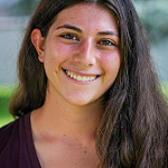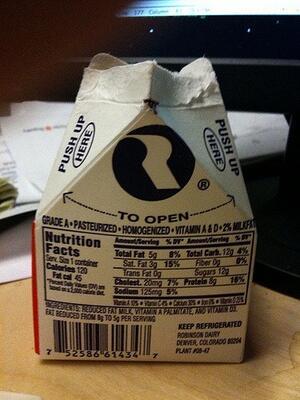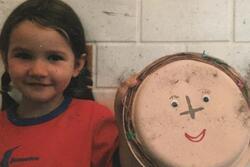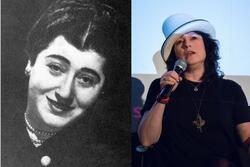Open Conversations and Dairy Products
Photograph of an open milk carton (Courtesy of Mark DeVries, Flickr: https://www.flickr.com/photos/mark_devries/3818040152)
“Where are you thinking about going to college?” I’ve been asked this question by almost everyone I know. It feels like after your bat mitzvah, there’s a second rite of passage that no one tells you about: college decisions. Since the winter of Junior year, every conversation seems to take a turn towards schools. The question, “How are you?” has been replaced with, “How are the applications coming?” In my community, I’ve been moved into a new category that isn’t “teenager,” but also isn’t “adult;” rather, I am now an “applicant.”
“Where are you thinking about going to college?” I feel so much anxiety and irritation when I hear that question. Yet, as much as I get this question, I also ask it myself. I never really considered the larger implications of the question, and I always expected the answer I received to be pretty much the same as my own answer. So, the question became my replacement for, “what’s up?” I didn’t realize there was another question that no one seems to ask: “Are you planning to go to college?”
This past summer I worked as a camp counselor. My co-counselors came from a variety of different schools, and ranged in age from 16 to 27. We worked nine-hour shifts, watching kindergarteners. To pass the time, the counselors made small talk. I would ask someone how their weekend was. They would ask me if I saw the latest movie in theaters. I would ask them what they did in their free time. They would ask me where I planned on going to college. I was used to the question, so I answered accordingly.
One day during lunch, I asked one of my co-counselors where she was thinking of going to college and she said, “Oh, I’m not going. We can’t afford it.” She didn’t say it in a mournful way. She didn’t sigh or frown. She said it with the same tone she used to ask the kids if they wanted milk with their lunches. I was taken aback. I was worried about offending her, and confused about what she would do if she didn’t go to college.
It’s important at this point to make it clear that this isn’t a story about a “poor girl” who I look down on. I don’t want my perspective to come across as pity or pride. I certainly don’t want to turn her into a single facet of her identity. I am not telling a story about a girl who is lesser than as a human being, because she isn’t less. She isn’t a rarity. She isn’t weird or sad. She’s simply different from me, and different doesn’t mean bad.
At the time, I was so blinded by my own privilege that I couldn’t see those facts. When she told me that she wasn’t going to college, I felt an instinctive urge to apologize to her. To pull back. To return to a moment that wasn’t awkward. Except, I’m pretty sure she didn’t see the moment as awkward; I was the only one who did. I was unfamiliar with confronting an experience so different from my own—with confronting my own privilege—so I felt guilty for bringing the subject up in the first place.
Once I began to feel guilt, I also began to feel attacked for having privilege. So, as my co-counselor passed out lunches to campers, I began to subconsciously blame her for making me feel bad. And therein lies the problem. I knew that whatever I was feeling wasn’t her fault, but our conversation sparked some serious questions for me: Should I feel guilty for my situation? Should I apologize? Am I less of a person because I have less to overcome?
The reason a lot of people feel uncomfortable talking about their privileges is that they don’t like feeling that same guilt that I felt. People don’t want to believe that their accomplishments in life and their status are only due to their privilege. Nobody wants their struggles to be invalidated.
There’s an article called Privilege 101: A Quick and Dirty Guide, written by Sian Ferguson. In it, she uses a metaphor about biking to describe privilege: You and a friend decide to go biking one day, but take different routes, and plan to meet at a predetermined spot. Your ride is difficult due to the sun, a bumpy road, and some uphill slopes, but when you reunite with your friend, they tell you that they didn’t have sunscreen, the whole ride was at an incline, and they hurt themselves. Ferguson ends the metaphor by posing and answering the question “Does it mean that you didn’t face obstacles? … No. What it means is that you didn’t face the obstacles she faced.” It’s important to recognize our own privilege and how it influences our lives, but just because we benefit from certain types of privilege doesn’t mean we don’t also experience real struggles, and overcome real obstacles.
“Privilege” is a word that often feels taboo, but the only way to dissolve the inequalities that various types of privilege create is by openly acknowledging it, and discussing how to combat the systems that make it possible. We should not whisper our inequalities, we should talk about them as openly as asking for another carton of milk. So next time someone asks me about college, I’m going to use it as an opportunity to, without judgement, start a larger conversation about privilege, differing identities, and inclusivity.
This piece was written as part of JWA’s Rising Voices Fellowship.








Great insight!